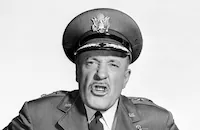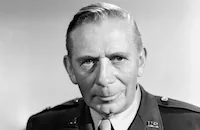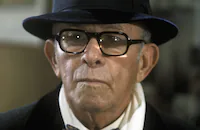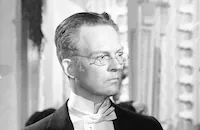The Solid Gold Cadillac

Brief Synopsis
Cast & Crew
Richard Quine
Judy Holliday
Paul Douglas
Fred Clark
John Williams
Hiram Sherman
Film Details
Technical Specs

Synopsis
At the annual shareholder's meeting of International Projects, Ltd., Edward L. McKeever, the founder and head of the company, announces that he has sold all his stock and is resigning to work for the Department of Defense in Washington, D.C. McKeever's departure delights the dishonest members of International's board of directors--Clifford Snell, Vice President and Treasurer; John T. Blessington, President and Chairman of the Board; and Warren Gillie, Vice President and Secretary¿all of whom see McKeever's absence as an opportunity to line their pockets with company profits. At the meeting, Snell presents his financial report, prompting Laura Partridge, who owns a total of ten shares in the company, to rise and question the board's inflated salaries. Afterward, in the building's coffee shop, Laura encounters McKeever, who offers to drive her home on the way to the airport. As they say goodbye, McKeever is amused when Laura offers to look after the company in his absence. True to her word, the meddlesome Laura attends every board meeting, and when she proposes forming a shareholders' committee, Blessington decides to short circuit her effort by hiring her to generate "good will" among the small stockholders. As Director of Shareholder Relations, Laura is given her own office and assigned Amelia Shotgraven as her secretary. Laura at first busies herself with matchmaking between Amelia and Mark Jenkins, the office manager, but soon grows bored and decides to write to all the small shareholders across the country. While Blessington grumbles about Laura's postage bills, his moronic brother-in-law, Harry Harkness, whom he has appointed to the board, drives Apex Clock, a subsidiary of the corporation, into bankruptcy. Soon after, McKeever comes to New York to address Snell's complaint that he has not awarded any government contracts to International. McKeever is dismayed to find Laura installed in her own office, but is soon enchanted by her enthusiasm and honesty. After Amelia is fired by Snell for providing Laura with the stockholders' addresses, she tells Laura that Blessington hired Laura to prevent her from disrupting meetings. Disillusioned, Laura is about to resign when she opens a letter from one of the shareholders, describing how International bankrupted Apex, its own company. Outraged, Laura determines to stay and fight and demands that Amelia be rehired. When Laura launches a campaign to mobilize the shareholders, Blessington decides to get her out of the office by sending her to Washington D.C. to confer with McKeever about stockholders' rights. McKeever suspects that the board sent Laura to entice him into awarding them some contracts until she begs him to come back and take over the company. That afternoon, McKeever finalizes all his contract negotiations and asks Laura to celebrate with him. After a night of dancing, McKeever books a room for Laura at his hotel. When Laura informs McKeever about the Apex Clock scandal, he becomes irate and decides to resign from his government job and immediately return to International. As the board watches the televised news of McKeever's impending return to private industry, they realize that they can outvote him because he has sold all his stock. Apprised of his powerlessness, McKeever devises a different strategy, accusing the board of illegally using Laura to lobby for government contracts. At a hearing into the allegations, the board's attorney suggests that Laura went to Washington not to win contracts for International, but because she was in love with McKeever. When the attorney questions Laura under oath, she admits to being in love and the charges are dropped. Laura then admonishes McKeever to attend the annual shareholders' meeting that afternoon and dispute the board's authority. After he refuses, they drive to Laura's apartment, where she begins to open a stack of letters that she has brought home from the office and finds proxies made out in her name enclosed in each envelope. When Amelia phones with the news that Jenkins has been fired for attempting to deliver Laura's mail, which Snell has locked in his office, McKeever realizes that control of the company resides in the proxies of the small shareholders. After hurrying to the International Building and finding bulging bags of mail addressed to Laura, McKeever sends Laura to the meeting to stall for time while he, Amelia and Jenkins count the proxies. Welcomed as a celebrity by the assembled small shareholders, Laura demands a count of all the votes. Just as Blessington is about to smugly declare the board's victory, McKeever bursts in and announces that Laura has garnered 3,000,000 votes and therefore controls the corporation. After firing the board, Laura presides at the next annual meeting as Laura McKeever, Vice President and Treasurer, the wife of President Edward L. McKeever. After announcing soaring dividends, Laura and McKeever adjourn the meeting and drive home in their solid gold Cadillac.

Director

Richard Quine
Cast

Judy Holliday

Paul Douglas

Fred Clark

John Williams
Hiram Sherman
Neva Patterson
Ralph Dumke

Ray Collins

Arthur O'connell

George Burns
Richard Deacon
Marilyn Hanold
Anne Loos
Audrey Swanson
Larry Hudson
Sandra White
Harry Antrim
Paul Weber
Emily Getchell
Charlotte Lawrence
Joe Hamilton
Maurice Manson
Suzanne Alexander
Oliver Cliff
Voltaire Perkins
William Hughes
Richard Grant

Don Dillaway
Walter Beaver
Wally Richard
Howard Price
Jean G. Harvey
Bud Osborne
Lulu Mae Bohrman
Madge Blake
Jack Latham
Ezelle Poule
Ethyl May Halls
Helen Van Toyl
Irving Mitchell
Neely Edwards
Ivo Henderson
Pat Marshall
Crew
Ross Bellah
Abe Burrows
Clay Campbell
George Cooper
Louis Diage
Helen Hunt
William Kiernan
Fred Kohlmar
Charles Lang
John Livadary
Jean Louis
Bernard Mayers
Cyril J. Mockridge
Irving Moore
Charles Nelson
Lionel Newman

Film Details
Technical Specs

Award Wins
Best Costume Design
Award Nominations
Best Art Direction
Articles
The Solid Gold Cadillac
But when the Columbia Pictures film version was released in 1956, moviegoers instead saw 34-year-old Judy Holliday in the part. It turns out that the play as originally written had actually called for a much younger actress, but it was rewritten to suit Hull; screenwriter Abe Burrows simply changed things back to the original conception.
Certainly Holliday was already as famous as Hull, a grande dame of the stage who had also left her mark in Hollywood with memorable performances in Arsenic and Old Lace (1944) and Harvey (1950). Holliday had scored big on Broadway with Born Yesterday and recreated that role to astonishing success in the movie version. In fact, Hull and Holliday both won their only Oscars® in the very same year, with Holliday taking Best Actress for Born Yesterday (1950) and Hull nabbing Best Supporting Actress for Harvey. With Jose Ferrer winning Best Actor for Cyrano de Bergerac (1950), another stage adaptation, and All About Eve (1950), perhaps the best movie about theater ever made, winning the rest of the major awards including Best Picture, it was definitely a Broadway-themed Oscar®: night. And just to hammer home the point, the greatest movie about Hollywood ever made, Sunset Blvd. (1950), lost the Best Picture award that same evening.
In The Solid Gold Cadillac, a corporate satire, Holliday's comedic abilities are aptly displayed. She plays a dizzy blonde who owns ten shares of stock in a major company and basically serves the profiteering board members their comeuppance. Paul Douglas co-stars as the former head of the company who joins forces with Holliday; a romantic subplot between the two was added for the movie. The stars' chemistry was a known commodity, as they had already worked together a few years earlier on stage in Born Yesterday. Narrating the movie from off-screen is George Burns, a job held by Fred Allen on Broadway.
Critics loved The Solid Gold Cadillac. The New York Times raved that "[Holliday] is knocking the role completely dead... She's an actress who has the ability to move mountains." Variety noted that the production "achieves a plushy look without the use of color or big-screen assists" (though there is a color sequence at the end). Indeed, that "look" landed an Oscar nomination for Best Black-and-White Art Direction, though the movie won only for Best Black-and-White Costume Design.
Producer: Fred Kohlmar
Director: Richard Quine
Screenplay: Abe Burrows, George S. Kaufman (play), Howard Teichmann (play)
Cinematography: Charles Lang
Film Editing: Charles Nelson
Art Direction: Ross Bellah
Music: Cyril J. Mockridge
Cast: Judy Holliday (Laura Partridge), Paul Douglas (Edward L. McKeever), Fred Clark (Clifford Snell), John Williams (John T. Blessington), Hiram Sherman (Harry Harkness), Neva Patterson (Amelia Shotgraven).
BW&C-99m.
by Jeremy Arnold

The Solid Gold Cadillac
Quotes
I had my swimming pool dug by an International Projects steam shovel. It's a darling shovel.- Miss L'Arriere
Miss Partridge, you see, I am a businessman. All my life I've concentrated on business. Now, this has necessarily forced me to devote more of my time to some things and less to others. You understand.- Edward L. McKeever
Sure. You're scared of girls.- Laura Partridge
Trivia
Notes
The offscreen voice of comedian George Burns provides a running commentary about the characters and action. Although the film was black and white, the final shots of the solid gold Cadillac are in color. In George S. Kaufman and Howard Teichmann's play, the character of "Laura," which was played on Broadway by Josephine Hull, was elderly, thus eliminating any romance between Laura and "McKeever." According to an August 1954 New York Times news item, producer Hal Wallis made an agreement with Kaufman, Teichmann and Broadway producer Max Gordon to purchase the rights to the play, which he wanted as a film vehicle for Shirley Booth. In a November 1954 Daily Variety news item, Wallis blasted Kaufman and Gordon for reneging on their agreement and selling the rights to Columbia.
A November 1955 New York Times news item adds that location shooting was done outside the Pentagon, Capitol and the Lincoln Memorial in Washington, D.C. The article notes that Congressman Earl Wilson of Bedford, MA, appeared as an extra in the House of Representatives scene. An August 1956 Hollywood Reporter news item notes that the Pearl Bailey recording "Solid Gold Cadillac" was featured in the film's publicity campaign, even though the song is not performed in the picture. The Solid Gold Cadillac won an Academy Award for Best Costume Design and was nominated for Best Art Direction. Paul Douglas and Judy Holliday had previously appeared onstage together in the play Born Yesterday.

Miscellaneous Notes
Released in United States Fall October 1956
Released in United States on Video October 17, 1995
Released in United States Fall October 1956
Released in United States on Video October 17, 1995














